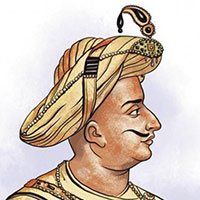Tipu Sultan
Tipu Sultan, also known as Tipu Sahab or the Tiger of Mysore, was the ruler of the Kingdom of Mysore based in South India and a pioneer of rocket artillery.
Tippu Sultan, also called Tippu Sahib or Fateh Ali Tipu, byname Tiger of Mysore, sultan of Mysore, who won fame in the wars of the late 18th century in southern India.
Tippu was instructed in military tactics by French officers in the employ of his father, Hyder Ali, who was the Muslim ruler of Mysore. In 1767 Tippu commanded a corps of cavalry against the Marathas in the Carnatic (Karnataka) region of western India, and he fought against the Marathas on several occasions between 1775 and 1779. During the second Mysore War he defeated Col. John Brathwaite on the banks of the Kollidam (Coleroon) River (February 1782). He succeeded his father in December 1782 and in 1784 concluded peace with the British and assumed the title of sultan of Mysore. In 1789, however, he provoked a British invasion by attacking their ally, the raja of Travancore. He held the British at bay for more than two years, but by the Treaty of Seringapatam (March 1792) he had to cede half his dominions. He remained restless and unwisely allowed his negotiations with Revolutionary France to become known to the British. On that pretext the governor-general, Lord Mornington (later the marquess of Wellesley), launched the fourth Mysore War. Seringapatam, Tippu’s capital, was stormed by British-led forces on May 4, 1799, and Tippu died leading his troops in the breach.
Tippu was an able general and administrator. He proved cruel to his enemies and lacked the judgment of his father, however.
Tipu Sultan was the innovator of the world’s first war rocket. The rocket he invented is still kept in a museum in London.Tipu Sultan was very fond of gardening and thus established the 40-acre Lalbagh Botanical Garden in Bangalore.
He brings about reforms which transform the landscape in Southern India.
Tipu reorganized his army along European lines, He developed new technologies, including the first rocket, to be used anywhere.
He modernised the agriculture and tax collection system.
He developed trade and commerce, including foreign trade.
Tipu took an active interest in foreign affairs and kept an eye on various events occurring across the world. He even sent ambassadors to various courts across the world. He kept a close eye in the American war of Independence. He even sent an emissary in 1788, in an unsuccessful attempt to restore the Franco-Mysore alliance.
His army had both Hindus and Muslims, and among the populations that he slaughtered in Kerala.
Just as there is evidence that Tipu persecuted Hindus and Christians, Other aspect which is highlighted in today’s media is:
He is a bloodthirsty tyrant who burnt down entire towns and villages, razed hundreds of temples and churches, and forcibly converted Hindus.
The historical record shows Tipu boasting about having forced infidels to convert, and of having destroyed their places of worship.

Tipu Sultan
Date of Birth: 20 Nov 1750
Birth Place: Devanahalli
Proffession: Ruler
Nationality: India
Death: 4 May 1799, Srirangapatna


